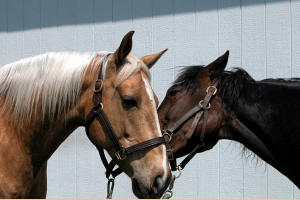| Home Horse Facts and Tips | First Posted Jan 26, 2010 Jan 21, 2020 | |
A New HorseSo, you have purchased a new horse. There is much to do before bringing that new horse to your property or to a boarding facility. Below are some thoughts to help organize the homecoming and help the transition go as smoothly as possible for all concerned--horses and humans. Just like humans, horses like routine and get use to it and take comfort in it. Change takes them out of their comfort zone and can cause stress. Of course, you have already checked out the safety of your horse's new environment. You have also asked the new place if your farrier, vet and trainer (if you have one) can come to the new place. I always check to see if mares and geldings are separated or together. I also want to know if the herd is stable or if there is allot of traffic in and out of the facility. I prefer a quiet, stable herd. I also prefer small numbers of horses--a private farm instead of a large boarding facility. This is personal choice and depends on what your needs and your horse's needs may be. Checklist Before the Move
At the New Place
 Preacher, the black bay, was quite aggressive and could be mean. Poor Tucker! It is not always possible to have it your own way unless you have your own property. Whatever your situation, no one wants to see any horse or human injured. Care should be taken when introducing a horse to a new environment. Horses are social animals and have a pecking order (hierarchy) society. Some are aggressive, some are not. In all the years that I have had horses, only once did one of our horses get hurt when being introduced to the other horses. He was kicked in the stifle and laid up for 6 weeks. It was not pleasant! Taking a little time to let the established horses and the new horse get acquainted is really helpful. Ideally the new horse can be kept at a distance in another paddock for a few days. Then he can be moved closer--across a fence--perhaps. It is important that the pasture area is not overwhelmed by too many horses. If at grass, rule of thumb is 2 acres per horse. For turnout one acre per horse. Make sure that the pasture is free of debris, farm equipment, old cares, etc. has no area where your horse can be trapped and cornered unable to escape if threatened and that the terrain is as safe as possible. Most horses have shoes on the front feet and not the hind feet, but shoes can be lethal weapons when introducing a new horse. We do not have dominion over this eventuality. If at all possible before turning the new horse out into the herd bring a middle ranking horse of good temperament into the Paddock where the new horse is being kept, after a few days. After than introduction has been made and both are happy turn them out into the herd. Give them a couple of days together. Also, when you turn the horses out make sure that everyone has been fed and that hunger and jockeying for position to eat is not an issue. Most likely there will be prancing and dancing, tails up, snorts, kicking and posturing, running and following. The new horse will be kept away from the herd, usually, by the alpha horse. The new horse will look on and just follow the herd until he has been accepted. I have seen horses run for days by other bullying horses. This is not a pretty picture. However, it usually does not happen. For the Next Few Days Keep a watch on your horse's eating to make sure that he is not off his feed. Also watch for any lameness or swellings for scuffles. Be mindful if your horse has any mood changes that are out of the ordinary. Just be observant to make sure the transition is smooth and safe. A Life Time To us it seems like a lifetime when introducing a new horse to a herd and new environment. Often we lose sleep over it and get nervous. Just remember that the horses have a way of doing what they do in their social order. We have to suck it up and adjust. We can only do our best. For More Information: Introducing a New Horse to the HerdHorse Herd Hierarchy |